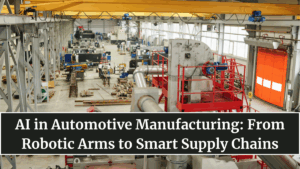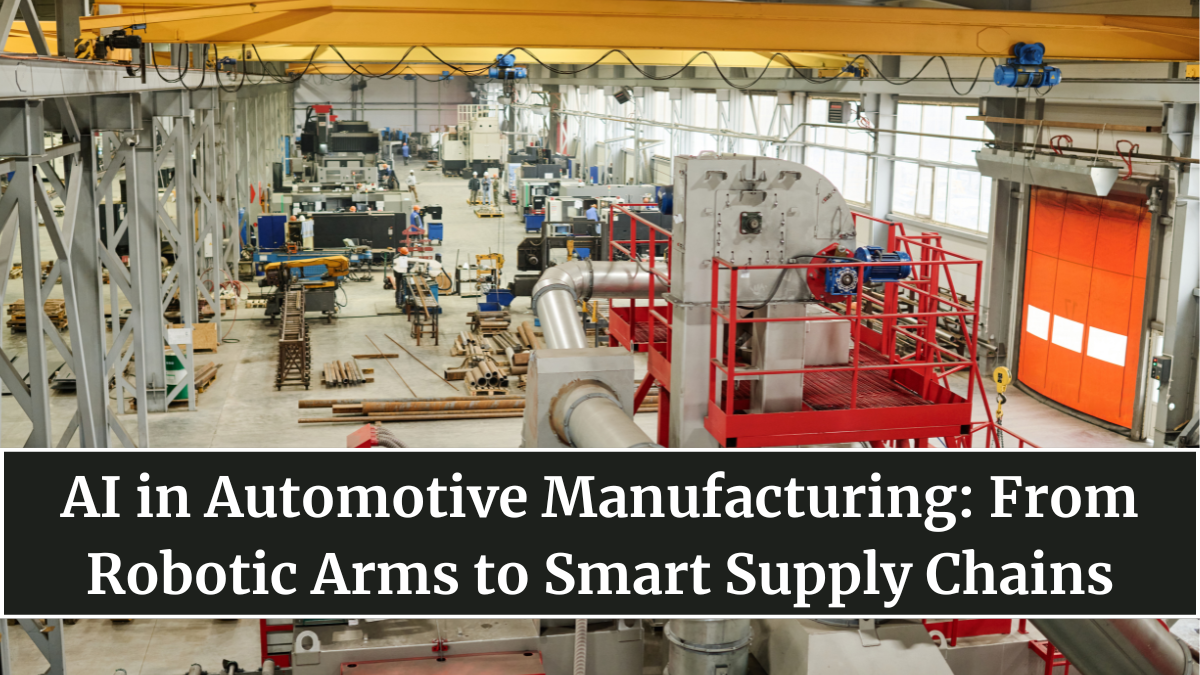A quiet revolution is sweeping across the automotive industry, powered not by steel and oil but by data and algorithms. The rise of AI in automotive manufacturing is redefining how vehicles are designed, assembled, and delivered — transforming the entire production chain from factory floors to logistics hubs.
From predictive maintenance and defect detection to autonomous robots and AI-managed supply chains, the world’s leading automakers are embracing artificial intelligence to make car production faster, safer, and smarter.

From Automation to Intelligence
For decades, car manufacturing has relied on robotics for precision and efficiency. But while robots followed fixed commands, modern AI systems learn and adapt in real time. This evolution marks a shift from mere automation to true machine intelligence.
AI-driven systems can now:
-
Predict equipment failures before they happen.
-
Inspect vehicle components for microscopic defects with computer vision.
-
Optimize workflows across assembly lines using adaptive algorithms.
-
Balance production schedules automatically based on real-time data.
Factories that once relied on static assembly routines are now evolving into smart, data-driven ecosystems, where every machine communicates, analyzes, and makes decisions on the fly.
The Role of AI in Car Production
AI’s integration in the automotive sector spans nearly every production phase.
| Stage | AI Application | Impact |
|---|---|---|
| Design & R&D | Generative AI design tools | Cuts concept-to-prototype time by 40% |
| Manufacturing | Predictive maintenance, robotics automation | Reduces downtime, improves precision |
| Quality Control | Computer vision for defect detection | Increases accuracy by up to 95% |
| Supply Chain | AI logistics & demand forecasting | Improves inventory efficiency and reduces waste |
| After-Sales Support | Predictive service analytics | Enhances vehicle reliability and customer satisfaction |
This end-to-end integration is creating what experts call Industry 4.0 for automotive, a future where software, sensors, and AI co-pilots every phase of production.
Global Leaders Driving the Change
The world’s top automakers are investing heavily in AI ecosystems that blur the line between tech and manufacturing.
-
Tesla uses real-time data analytics and neural networks to optimize its Gigafactory production cycles.
-
BMW employs AI-driven defect detection using high-resolution cameras across 30+ plants.
-
Toyota leverages predictive maintenance algorithms to minimize assembly downtime.
-
Hyundai integrates AI-based welding and painting robots for unmatched precision.
-
Volkswagen’s “Industrial Cloud” uses AI to connect suppliers, logistics, and factories globally.
These examples demonstrate that AI isn’t just a support tool — it’s now the strategic backbone of modern automotive competitiveness.
Smart Supply Chains and Predictive Logistics
The post-pandemic era exposed major vulnerabilities in global automotive supply chains. AI is now playing a pivotal role in restoring resilience. Predictive algorithms forecast disruptions, analyze geopolitical or weather data, and dynamically re-route shipments.
Fleet tracking systems powered by AI can also monitor traffic, energy use, and delivery patterns to minimize costs and emissions. This results in smarter logistics networks that are faster, leaner, and more sustainable.
AI even predicts demand fluctuations, ensuring factories produce just the right number of vehicles — avoiding both shortages and surpluses.
Benefits Beyond Efficiency
AI doesn’t just improve productivity; it transforms how human workers engage with technology. Collaborative robots (cobots) now work safely alongside humans, learning from their behavior. AI-powered training systems use augmented reality to guide new employees through complex assembly steps, improving both safety and skill retention.
For customers, this revolution means higher-quality cars, fewer recalls, and vehicles produced with precision and sustainability at their core.
Challenges Ahead for AI-Driven Manufacturing
Despite its promise, AI adoption faces significant hurdles:
-
High implementation costs for advanced sensors and machine learning systems.
-
Data security risks in connected factory environments.
-
Shortage of skilled AI engineers for industrial applications.
-
Ethical and regulatory questions about algorithmic decision-making in safety-critical processes.
However, with rising investments and stronger AI policies across major economies, these challenges are being systematically addressed.
The Road Ahead: Fully Intelligent Factories
By 2030, most automotive factories are expected to be AI-first ecosystems — where machines predict outcomes, optimize themselves, and collaborate seamlessly with human teams.
AI will not only build cars; it will reimagine the concept of production — combining digital twins, blockchain-based traceability, and self-healing manufacturing systems. The result: zero downtime, zero defects, and a truly sustainable automotive value chain.
The road ahead is no longer about horsepower — it’s about computing power.
FAQs
What is AI’s role in car manufacturing?
AI enhances every stage — from design and assembly to quality control and logistics — through automation, prediction, and optimization.
How does AI improve quality control?
Using computer vision and machine learning, AI detects even microscopic defects in vehicle parts faster than human inspection.
Which automakers are leading in AI adoption?
Tesla, BMW, Toyota, Volkswagen, and Hyundai are among the pioneers integrating AI across manufacturing and supply chain operations.
What are smart factories in the automotive sector?
They are data-driven plants where machines, sensors, and AI systems communicate autonomously to improve efficiency and reduce errors.
What’s next for AI in automotive manufacturing?
Expect fully autonomous factories, AI-designed vehicles, and predictive supply chains where every process learns and improves over time.
Click here to know more.
